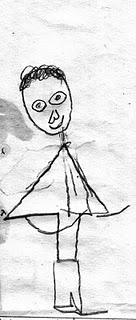My son came up to me the other night and said, “Mummy says you have to come. Mummy needs you to take Chloe (pronounced toe-ee) to bed. Toe-ee asleep on mummy’s bed.
I wanted to cry and jump up and down with delight at the same time, not because my seven-year-old daughter was asleep or that he was still awake at 9:30 p.m.
No, it was because that was a fine and long bit of clear and understandable communication from my five-year-old son.
Then he said, “Watch me, daddy. Me go fast, me go fast… like a rocket.”
And off he raced to mummy.
Hallelujah, I said to myself. Like a rocket – that was a simile, or a metaphor. Whatever it was it was a good bit of talking for my son who struggles to get his words out in order or in any sort of understandable fashion. Or even at all. My son is autistic. He learns differently, and he often minces his words. He struggles to draw a line and a circle. He puts his clothes on backwards and thinks that’s quite fine. He’s painted his face with permanent marker without minding at all, and he’s rather unaware of the looks he gets in the street and in the supermarket and from the doorman. He made a face at the newspaper vendor that made him look scary with his war paint on. He didn’t think anything of it. If you get to know him, he’s the loveliest boy. Full of cuddles and laughs, a boy who loves getting tickled and loves to laugh cheerfully and asks for more tickles. He complains, of course, and screams loudly when he gets stuck pulling his T-shirt on or if he can’t get his two legs into his underwear. We can get him dressed before an outing and before we know it his clothes are off (except the T-shirt that he’s still struggling to get his arms out of). The rest of his clothes will be scattered around the room – his shoes under the bed, his socks under the dog and the cat will be asleep on his jeans, and he is shivering in the cold but not quite knowing it. He looks up at mummy and daddy who are all ready to go out. And he smiles. He’s a lovely boy and so it is hard to get mad at him.
The prognosis for his development is good. He has high-functioning autism, meaning that it is not very noticeable until you’re with him for a while and see his frustration come out at doing simple things. Like holding a pencil.
The specialists say he’ll find his way in life and find something he loves to do and excels at. Maybe surfing. A prominent composer, an artist or a scientist, maybe a soccer star at Boca Juniors or River Plate, the big-name teams in Buenos Aires, where we live.
Yet before that he may get bullied at school for being different, and he may shy away from society. His peers may catch on that he’s slower, copies a lot, repeats, mimics. That he doesn’t invent on his own and that he struggles to do what comes naturally to most kids. This may isolate him; open him up for taunting no matter how lovely he is.
We don’t really know. It is hard for us, and we know that we have a long, long road ahead.
But maybe, just maybe, his development will be as fast as he is running now through the living room and to mummy – like a rocket.





